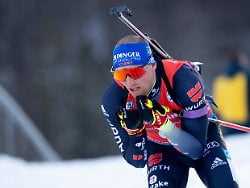Anyone who wins a medal at the Olympic Games has paid a lot for it: countless hours of training, missed partying with friends, little aches and pains ignored. The sport usually costs a lot of money. The reward then hangs around the neck. It is more of an idealistic nature. Especially for some Germans.
20,000 euros for an Olympic victory, 15,000 for silver, 10,000 for bronze. That’s what a top performance in Germany is worth. With these bonuses, the German Sports Aid rewards the athletes at the Winter Games in Beijing. Certainly an additional motivation for the Germans.
But not for everyone, as Erik Lesser made public. The biathlete wrote on Instagram that he would not get anything from Sporthilfe if he won. “Alpine skiing, men’s ski jumping and biathlon get exactly zero euros for it, but a lot of fame and honor,” said the 33-year-old. Cynically, and referring to the clapping for health workers during the pandemic, he went on to write: “It just occurs to me: if you stand on the balconies and just clap, it’s like ‘thank you’.”
It is true that these athletes “are no longer financially supported”, which is why they do not receive any Olympic bonuses, a spokesman for Sporthilfe told ntv.de. “This decision was made in coordination with those responsible and the athletes’ spokesman of the German Ski Association, but only affects the athletes from the Olympic squad.” The reason for this is the “relatively good earning potential” in these sports compared to other Olympic disciplines.
At the same time, Sporthilfe emphasized that the athletes affected were also exempt from the solidarity contribution. “The money is not saved either, but benefits the athletes from the squads below and thus the youngsters,” said Stefan Schwarzbach, board member of the German Ski Association of the German Press Agency.
Bonuses repeatedly criticized
Of course, no one can live and do their sport even with 20,000 euros, not alone with the help of other sports aid funding. Sponsors, employers such as the Bundeswehr or the police are necessary. This is made clear by the example of bobsleigh pilot Johannes Lochner. He has 150,000 euros in fixed costs per season for himself and his team. He has to pay for his brakeman himself, the training camp, the material, the vehicles, travel, hotels, as he reported in the ARD documentary “Playing with Fire”.
In addition to the Sporthilfe premium, the individual associations also offer rewards. The German Ski Association, for example, pays 25,000 euros for gold, for silver and bronze there are 15,000 and 7,500 euros, according to Schwarzbach: “Of course Erik Lesser is right that this is relatively little compared to salaries and bonuses in other professional sports.”
There are always discussions about the premiums. In the run-up to the Summer Games in Tokyo, rowing world champion Oliver Zeidler called the 20,000 euros “a bit embarrassing”. “You can add at least one zero to it,” he said in the “Press Club”. The German footballers, on the other hand, who make a very good living from their sport, would have received €400,000 each from the German Football Association if they won the European Championship in the summer.
Italy rewards richly
Lesser and his friend and former teammate Arnd Peiffer also discussed the topic of bonuses in their podcast “The Biathlon Double Room”. Since Lesser emphasized that it was “unlikely” that he would win a medal. “Nevertheless, it’s kind of funny.” He also asked rhetorically: “If I had no sponsors, would I get exactly nothing for my Olympic medal?”
It is completely different in other countries, in some cases the premiums are at levels that only footballers in this country know. In South Korea there is a lifelong pension, said Peiffer, who now works as an expert for ARD. In Belarus, Nadezhda Skardino, Olympic bronze medalist in 2014 and Olympic champion in 2018, was given an apartment in Minsk, Lesser said. Italy, too, in Beijing with 118 participants at the start, pays heavily: there is 180,000 euros for gold from the Olympic Association, 90,000 euros for silver, bronze is rewarded with 60,000 euros. According to Eurosport, the national winter sports association has also promised to distribute an additional one million euros among the athletes who return with at least one medal.
In Germany, the line-up for competitive sports is different. Not all athletes therefore consider higher bonuses to be the right incentive, emphasizing the importance of continuous support. In any case, the ideal value of a medal is greater than the financial one.
